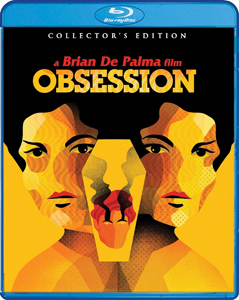Nowadays we’re familiar with the idea of a “legacy sequel”: a new (but not too new) story set against a beloved classic’s backdrop of visuals, style and mood. A recent example is “Alien: Romulus” riffing on past “Alien” films.
Brian De Palma was doing “legacy” follow-ups before they were cool, famously (or infamously) keeping Hitchcock’s style alive as the master’s career wound down, with the “Rear Window”-“Psycho”-“Suspicion” riff “Sisters” (1972) putting him on the map.
His next jaunt into Hitch’s playground is “Obsession” (1976), which I always knew riffs on “Vertigo,” and upon this viewing I realize it has a healthy dose of “Rebecca,” too. Of course, De Palma brings some of his own toys, such as his interest in tape recording. (Unfortunately, “Blow Out’s” John Travolta isn’t on hand to examine the tape of the kidnappers’ phone call.)

“Obsession” (1976)
Director: Brian De Palma
Writers: Paul Schrader (screenplay, story), Brian De Palma (story)
Stars: Cliff Robertson, Geneviève Bujold, John Lithgow
It’s like ‘Vertigo,’ but it’s so not ‘Vertigo’
Purposely putting yourself up against “Vertigo” – the BFI’s second-best film of all time – shows either confidence or a lack of worry about such things. Despite boasting a script by Paul Schrader, who in that same year wrote “Taxi Driver,” “Obsession” is not on the level of “Vertigo.”
It has striking superficial similarities, though. In the spirit of legacy follow-ups De Palma explores nooks and crannies of that film, including motifs like our leads’ exploration of religious structures. Michael (Cliff Robertson) is a New Orleans real-estate magnate who isn’t passionate about his job – or anything, even his wife Elizabeth (Geneviève Bujold, “Coma”) and daughter Amy (Wanda Blackman).
But when they seemingly die in a kidnapping gone wrong, and we jump ahead from 1959 to the film’s present day, Michael’s funk reads differently: He’s obsessed with having caused their deaths. Robertson’s performance is regularly criticized as being too staid, but I think it’s at least purposeful, not lazy acting.
Bujold lets her beauty do a lot of the performing, especially when she pops up again as Sandra, an Italian art restorer. Later, Bujold is asked to play yet another role, in a way. And it is … interesting. But “Obsession” is never as engrossingly odd as “Vertigo,” even though – or perhaps because – it ultimately is more plot-focused.
And until the ramped-up final act, composer Bernard Herrmann (“Vertigo”) carries “Obsession” like a superstar NBA player tries to carry four weaker teammates. I also can’t quibble about scenery in New Orleans and Italy, like when Michael is courting Sandra and he takes her to her doorstep in practically ancient Florence.

Not as weird as it needs to be
“Obsession” technically gives us more of the courted woman’s POV than “Vertigo” does, but that actually hurts the film. While Bujold at least equals Kim Novak in beauty, the ways the respective films communicate Scottie’s and Michael’s obsessions with the women land differently.
Neither man’s behavior is healthy – and probably also not likely to draw a woman’s interest except in pieces of fiction written by men – but Scottie’s obsession feels painfully real and therefore has a tragic dark-fairy-tale beauty.
Michael’s obsession is logically understandable and as such rather mundane. The idea of tackling it with psychiatric treatment – as his business partner Robert (John Lithgow, “Blow Out”) advises – seems sensible.
Schrader’s final-act “Chinatown”-esque “surprise” doesn’t come out of nowhere; indeed, I thought of it as a possibility all along. Given that film logic can be looser than real-world logic, it lands in fair territory. But nonetheless it likewise lands flat for what should be a bizarrely wrenching revelation to our main character.
Due to all these elements that don’t quite come together, “Obsession” merely reaffirms the legacy of “Vertigo.” And yet if De Palma’s attitude was one of “devil may care” experimentation, he wasn’t wrong: “Obsession” is a fascinating curiosity among film nerds, and safely forgotten by the mainstream.

